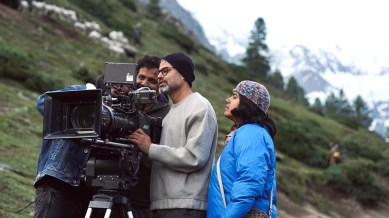Stay updated with the latest - Click here to follow us on Instagram
Tricity filmmakers script a new cinematic language
Their upcoming film, Sindhoori Visa, tackles immigration and transactional relationships in the UK Punjabi diaspora.

In some quiet corners of Mohali and Chandigarh, far from Bollywood’s spectacle-driven studios and glossy PR machines, a quiet revolution is underway. A new generation of fiercely independent storytellers — filmmakers, theatre artistes, colourists, and guerrilla crews -— is crafting a distinct cinematic language. Working with borrowed cameras, local actors, and micro-budgets, they are reclaiming cinema as a medium of meaning: personal, political, and unvarnished.
At the heart of this movement are five emerging production houses -— Nazariya Productions, Beans Media, Colorkaar, Tranza Studio, and Vinkal Studios — and one filmmaker who has already made global ripples: Anmol Sidhu.
Anmol Sidhu: A filmmaker
Anmol Sidhu, director of the acclaimed Punjabi film Jaggi (2022), comes from Kauloke, a small village in Bathinda district. His initiation into cinema came through years in theatre and obsessive film-watching. “I was a theatre student for four years,” he says.
“And I watch five films a day. That’s where all my passion comes from.”
Jaggi, a bold critique of toxic masculinity in rural schools, was produced on a shoestring budget. “I borrowed money from friends, and a wedding photographer from my village shot it,” Sidhu recalls. “I edited and dubbed it at home. Even the actors were locals.”
Despite its humble origins, the film won both Best Feature Film Debut and Audience Choice Award at the Indian Film Festival of Los Angeles. “If a film is good, it will find value,” he says. “Cinema is still stuck in comedy and music. We’re trying to shift it toward something deeper.”
Sidhu counts Anurag Kashyap among his key influences but also draws inspiration from world cinema masters like Cristian Mungiu, Iñárritu, Haneke, and Henry Alex Rubin. His second feature, Punjabi, is now nearing completion.
Nazariya Productions
Founded by Dibankar Jain, Nazariya Productions reflects the ethos of a generation raised on street theatre and activism. “We started from university circuits — Chitkara, Symbiosis — doing street plays,” says Dibankar. “The idea was always to use storytelling to shift public consciousness.”
Their work has since moved to screen, tackling themes like education, inequality, and tribal rights. One of their recent films, Echoes of the Herd, explores girl education in Himachal Pradesh.
“Our upcoming feature is set in Kolkata and continues to explore human emotion through the lens of education,” Dibankar says. “We just want people to change their nazariya — their worldview.”
Beans Media
Beans Media emerged from an unlikely place: an engineering background. Co-founder Kunal Walia left mechanical engineering to pursue photography, eventually co-founding the studio in 2019. “I realised I was spending more time behind a lens than with machines,” he says.
“That’s when I knew.”
The studio embraces guerrilla-style shooting and lo-fi aesthetics. Their April project, Pickpocket, was shot with a small crew and minimal gear. “Bombay’s ecosystem is chaotic — it doesn’t work for everyone,” says Kunal. “We do commercial work for the pocket, and independent work for the soul.”
Beans Media is now preparing for a feature film, leaning on a network of indie professionals. “It’s important to build your own ecosystem if you want to tell your own stories,” he adds.
Colorkaar
While not a production house in the traditional sense, Colorkaar is a vital node in the indie network. Founded during the pandemic by Uday Oswal — a cinematographer-turned-colourist — the studio has become a go-to for post-production support.
“I’ve always been fascinated by what happens after the shoot,” Uday says. “I’ve been editing and colour grading since school. I love giving a film its final tone.”
Colorkaar’s portfolio includes independent features, shorts, and even international commercial work. “We graded Farebi by Chaar Diwaari.
I’ve worked closely with filmmakers like Anmol Sidhu,” Uday notes. “You don’t need big budgets to make a film look good; you need just vision.” He sustains his work through commercial assignments but remains deeply committed to indies. “There’s something raw and beautiful about helping someone realise their vision with just a laptop and a calibrated monitor,” he adds.
Tranza Studio
Founded in 2017 by Angad Singh and friends while still in law school, Tranza Studio channels theatrical roots and cinematic ambition into compelling storytelling. “We were all into theatre, and wanted to bring that same emotional intensity into films,” says Angad.
Their portfolio ranges from sci-fi shorts to music videos on mental health. “Right now, we’re working on two projects: a black comedy set in a Punjabi village and a short film about urban alienation,” he says.
Tranza leans into visual symbolism and neo-realism. “We don’t want to just entertain. We want to make you feel — even if it’s on a tiny budget.”
Vinkal Studios
At the other end of the indie spectrum is Vinkal Studios, founded by veteran playwright and national award-winning scriptwriter Pali Bhupinder Singh. After a critical yet commercially unsuccessful debut with Stupid Charan, Singh doubled down on his commitment to meaningful cinema. “I’ve written over 40 plays,” he says. “We didn’t start Vinkal to make money. We started it because we believed cinema could still provoke and question.”
Their upcoming film, Sindhoori Visa, tackles immigration and transactional relationships in the UK Punjabi diaspora. “A girl marries a stand-up comedian to get permanent residency. It’s risky, but it’s real,” Singh says. “We’re experimenting with genre, tone, and form. That’s the only way forward.”
The writer is an intern with The Indian Express